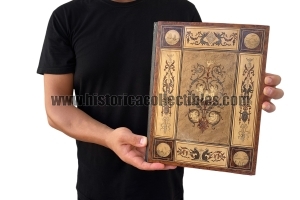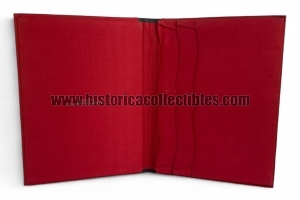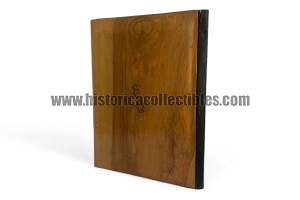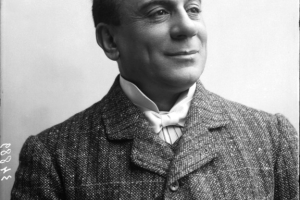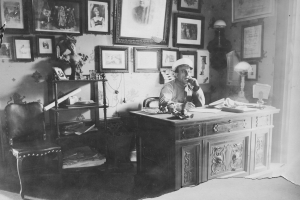Document Holder belonging to Eduardo Scarpetta, Neapolitan Actor and Playwright, circa 1922
Personal document holder, belonging to Eduardo Scarpetta (Naples, 12 March 1853 – Naples, 29 November 1925) Italian actor and playwright, considered the most important actor and playwright of the 19th century.
Eduardo was the founder of the Scarpetta-De Filippo theatre dynasty. He created modern dialect theatre, still in use today, and specialized in adapting the Neapolitan language in many French pochades; some of his most famous comedies (including for example Miseria e Nobiltà) were however original creations from his great repertoire.
The document holder is made of wood with beautiful Sorrento grotesque inlays, inside it is written in gold letters "GRAND. UFF. EDUARDO SCARPETTA", a title conferred on him on 20 June 1922, with which he boasted in documents and formal writings. On the back, in blue and red enamels, the monogram with the initials of his name. The masks and decorations on the front of the folder, made in very fine Sorrento inlay, reflect the decorations of many of his theatrical productions.
It is possible to date this artifact with relative precision since, inside, the name of Eduardo Scarpetta is preceded by the title of Grande Ufficiale (Grand Officer) which he was awarded later in 1911, as can be learned from one of his business cards which, dated 1911, still bears the title of Commendatore.
Excellent condition, without any missing or broken parts.
Eduardo Scarpetta, born Odoardo Lucio Fausto Vincenzo Scarpetta (Naples, March 12, 1853 - Naples, November 29, 1925), was an Italian actor and playwright. He was the most important actor and author of Neapolitan theater between the end of the nineteenth century and the beginning of the twentieth century, founder of the Scarpetta-De Filippo theater dynasty. He created modern dialect theater, still in use today, and specialized in adapting many French pochades to the Neapolitan language; some of his most famous comedies (including, for example, Miseria e nobiltà) were original creations from his repertoire. He boasts a very long career as a playwright (since 1875), abruptly interrupted by a famous lawsuit brought against him by Gabriele D'Annunzio in 1904.
Scarpetta was also a film actor at the dawn of the "seventh art". He shot some films for a Milanese production company, the “Musical Film” by Renzo Sonzogno, taken from his comedies: Miseria e nobiltà (1914, directed by Enrico Guazzoni), La nutrice (1914, directed by Alessandro Boutet), Un antico caffè napoletano (1914), Tre pecore viziose (1915) and Lo scaldaletto (1915) directed by Gino Rossetti. Of these films, only a few stills of Scarpetta and other actors remain.
He had nine children, not all of whom he recognized. In addition to Vincenzo, Domenico and Maria Scarpetta, there are the famous Eduardo, Peppino and Titina De Filippo, Ernesto Murolo, Eduardo De Filippo (aka Eduardo Passarelli) and his brother Pasquale De Filippo.
Reference:
https://www.eduardoscarpetta.it/
Bibliography:
- Maria Scarpetta, Felice Sciosciammocca mio padre, Napoli, Morano, 1950;
- Mario Mangini, Eduardo Scarpetta e il suo tempo; prefazione di Eduardo De Filippo, Napoli, Montanino, 1961;
- Eduardo De Filippo, Quattro commedie di Eduardo e Vincenzo Scarpetta, Torino, Einaudi, 1974;
- Eduardo Scarpetta, Cinquant'anni di palcoscenico: memorie; introduzione di Renato Carpentieri; prefazione di Benedetto Croce, Roma, Savelli, 1982;
- Eduardo Scarpetta, Il teatro di Scarpetta, Napoli, Bellini, 1990;
- Eduardo Scarpetta, Tutto il teatro, a cura di Romualdo Marrone, 1ª edizione, Roma, Newton Compton, 25 novembre 1992;
- Tiziana Paladini, Scarpetta in giacca e cravatta, Napoli, Luca Torre, 2000;
- Salvatore Tolino, Mostra storica permanente della Poesia, del Teatro e della Canzone Napoletana, Istituto Grafico Editoriale Italiano, 1999;
- Antonio Pizzo, Scarpetta e Sciosciammocca. Nascita di un buffo, Roma, Bulzoni, 2009;
- Mariano d'Amora, A History of Neapolitan Drama in the Twentieth Century, New Castle, Cambridge Puiblishing Scholars, 2016.

